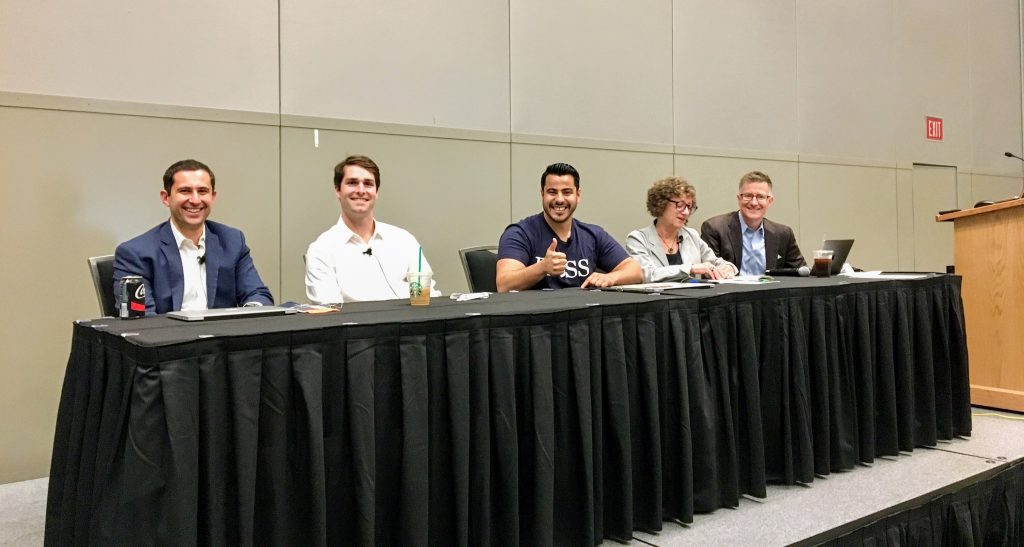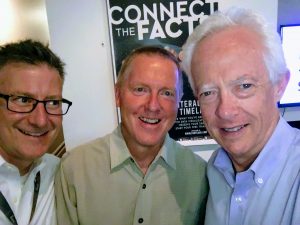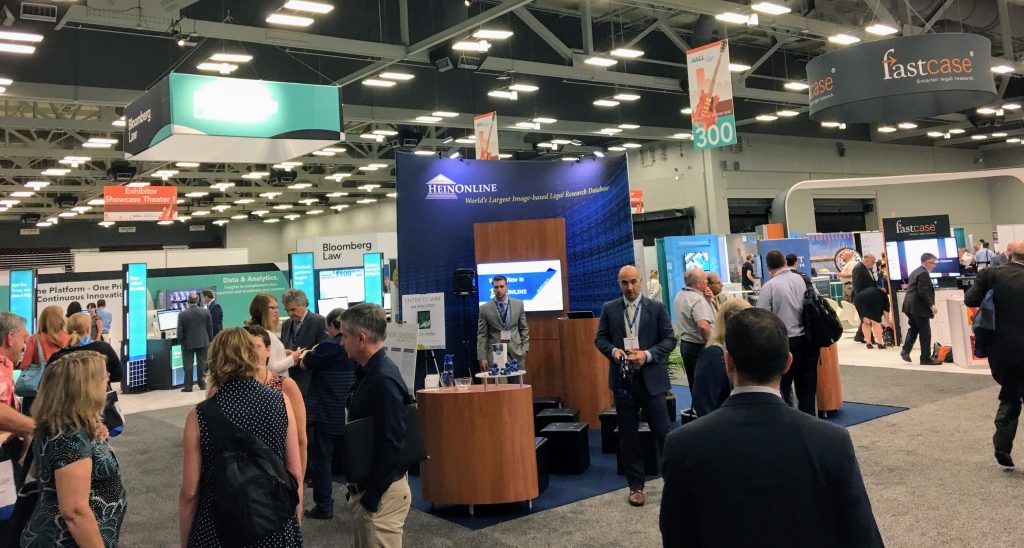People often ask me which are the best legal technology conferences to attend. As I pointed out in a column last year at Above the Law, three conferences form a triumvirate of national legal tech conferences that draw the most attention and biggest headcounts: ILTACON, which is just around the corner, Aug. 13-17, in Las Vegas; Legaltech New York, which is Jan. 30 to Feb. 1, 2018; and ABA Techshow, which this year is March 7-10, 2018, in Chicago.
But just because those are the biggest doesn’t mean they’re the best. As with so many other things, what’s best for you depends on your focus and interests. A conference I’ve repeatedly recommended is the Clio Cloud Conference, which I’ve called one of the best legal technology conferences I’ve ever attended. Another I’ve recommended, particularly for smaller-firm lawyers, is Avvo’s Lawyernomics, where the focus is on marketing and biz dev.
Now I have another to add to my list of recommended legal tech conferences: the annual conference of the American Association of Law Libraries. In fact, I’d put it among those at the top of the list.
I’ve just returned from this year’s AALL conference in Austin. I’ve attended this conference off and on going back as far as 1994. I’ve even spoken there on occasion. It’s always been a highly informative, substantive and enjoyable conference. But this year it struck me just how much this has become one of the leading legal technology conferences.
Technology, of course, permeates every aspect of law practice these days. As a result, just about every legal conference is going to have a technology component to it.
But something bigger is happening with the legal professionals we’ve long called law librarians. They are wearing an increasing number of hats these days, and a major one has become legal technologist.
The changing role of librarians is reflected in their evolving titles. I wrote about this back in 2014 in a post, Turning Challenges Into Opportunities: New Directions for Legal Information Professionals. More recently, this was evidenced in ALM’s decision to rename its annual survey of law librarians as the Survey of Law Firm Knowledge Management, Library, and Research Professionals. Wrote ALM’s Mary Ellen Egan in introducing this year’s survey:
[W]e found these information professionals are increasingly focused on data and analytical tools to provide cutting-edge research for their firms. And because of the vast amounts of data created by these technologies, the jobs of library leaders have become much more complex. They are increasingly working on matters such as business intelligence and competitive intelligence that are central to firm strategy.
That ALM article quotes Steve Lastres, director of knowledge management services at Debevoise & Plimpton: “Our work has gone beyond research and into AI, data analytical tools, and business development. We are providing a level of service and customization that we have never offered before.”
It is indicative of where AALL is headed that one of the nation’s top legal technology bloggers, Greg Lambert of 3 Geeks and a Law Blog, has just become the association’s president. By day, Lambert is the chief knowledge services officer at Jackson Walker, and his LinkedIn profile says it all:
Librarian-Lawyer-Knowledge Management-Competitive Analysis-Computer Programmer…. I’ve taken the Renaissance Man approach to working in the legal industry and have found it very rewarding.

Panel on new tools for legal research included Jake Heller, CEO of Casetext; Daniel Lewis, CEO of Ravel; Andrew Arruda, CEO of ROSS Intelligence; Susan Nevelow Mart, library director at the University of Colorado Law School; and Ed Walters, CEO of Fastcase.
Lambert’s description of himself is an apt job description for today’s law librarian (recognizing that many are neither lawyers nor men). Consider this sampling of some of the program titles from this week’s conference:
- The Law Library as Technology Laboratory.
- Understanding the Human Element in Search Algorithms.
- Deep Dive: How Artificial Intelligence Will Transform the Delivery of Legal Services.
- Case Law as Data: Making It, Sharing It, Using It.
- Watson in the Law Library: Using AI and Machine Learning to Build the 21st Century Library.
- Teaching and Implementing Emerging Technologies in Legal Practice.
- Moneyball for Lawyers: How Legal Analytics Is Transforming the Business and Practice of Law.
- The Axis of Access: How New Tools Pose a Challenge to Traditional Legal Research.
A first at this year’s conference was an innovation tournament in which three finalists presented solutions they’d developed to address particular challenges in legal information and legal practice. One winner, Jennifer Wondracek of the University of North Texas-Dallas, is developing a public speaking app that offers a virtual reality environment to practice speeches or presentations, providing a realistic environment complete with coughing audience members and ringing cell phones, and that gives the speaker feedback. Another winner, Katherine M. Lowry, director of practice services at BakerHostetler, is developing chatbots for the firm’s intranet that will help lawyers find information resources targeted to the task at hand.

The obligatory selfie with Ed Walters of Fastcase and Kevin O’Keefe of LexBlog.
Using technology to enhance law practice is a core function of today’s information professional. Part of that means consuming technology in an informed and strategic way, and there were plenty of technology vendors at AALL showing off products with all the au courant buzz phrases of artificial intelligence, legal analytics, data mining and cloud computing. “We are on the frontline of technological adoption for our firm,” Debevoise’s Lastres said in the ALM article I mentioned above. “We have to evaluate and review each product, and make recommendations to our attorneys.”
But another theme I heard repeated several times is of information professional as maker of technology. Fastcase CEO Ed Walters made this point during a panel on AI in which he talked about his company’s new AI sandbox, a testing environment for legal professionals to try out AI software. “We want to create an environment where you can be not just a consumer of AI tools, but a maker of them,” Walters said.
Repeatedly, I heard attendees and speakers make exactly this point. Within their firms and organizations, they are increasingly taking on the role of innovator, finding better and more efficient ways to help lawyers do their jobs and serve their clients. Sometimes that means buy it. Sometimes that means build it. But almost always it boils down to technology.
To attend AALL is to spend time with some of the most technologically savvy and innovative minds in the legal profession. They are legal professionals whose job is to be ahead of the curve. Next time someone asks me about the best legal technology conferences. AALL will be high on my list.
 Robert Ambrogi Blog
Robert Ambrogi Blog